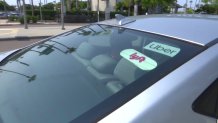Don't be fooled. While it may be called "California Proposition 22," the initiative that will ultimately decide the employment classification of Uber and Lyft drivers in that state could reverberate across the country.
First, let's rewind. This particular ballot box battle has been more than a year in the making and actually succeeded in bringing fierce rival companies Uber and Lyft together in a unified response.
Uber and Lyft together have spent nearly $100 million on the ballot initiative to overturn state law Assembly Bill 5 (AB5) that would compel them to classify drivers as employees. That may sound like a lot, but the two ride-hailing companies would each face more than $392 million in annual payroll taxes and workers’ compensation costs under the law – even if they drastically cut the number of drivers on their platforms.
More from NBCLX
What a Biden or Trump Presidency Could Mean for Your Student Loans
Your Vote Will Decide Who Regulates Speech on the Internet, So You'd Better Show Up
When AB 5 did pass in California last year, it established criteria that made it more difficult for the app-based companies to classify their workers as independent contractors instead of employees. In May, California sued Uber and Lyft, alleging they misclassified drivers as independent contractors under the new labor law.
Fast forward to 2020 and voters are being asked to consider Proposition 22, which would consider app-based drivers to be independent contractors and not employees or agents. Prop 22 also includes a mandate that app-based drivers are provided with benefits like minimum compensation, healthcare subsidies, vehicle insurance and training.

The issue has even elicited a response from U.S. Democratic presidential candidate Joe Biden and his running mate Senator Kamala Harris, both of whom voiced strong support for California’s labor law and have called on voters to reject the companies’ ballot proposal that would weaken it.
What's at Stake?
- A “Yes” vote on California’s Proposition 22 gives Uber and Lyft what they want, which is to overturn AB5, which took effect in January.
- If the proposition fails Uber and Lyft have said they could abandon the California market altogether.
- California represents Uber and Lyft’s largest source of revenue. If the companies choose to abandon the state it could put the future of both companies in jeopardy.
- If the proposition fails but Uber and Lyft continue in California, the companies say they would need to significantly hike prices to offset at least some of those additional costs.
- Other U.S. states have said they plan to follow California’s lead and pass similar laws.
What Uber and Lyft Say
In it's opposition to AB 5 an Uber spokesperson said in a statement, “At a time when California’s economy is in crisis with four million people out of work, we need to make it easier, not harder, for people to quickly start earning. We will contest this action in court, while at the same time pushing to raise the standard of independent work for drivers in California, including with guaranteed minimum earnings and new benefits.”
Lyft added in a statement: “We are looking forward to working with the Attorney General and mayors across the state to bring all the benefits of California’s innovation economy to as many workers as possible, especially during this time when the creation of good jobs with access to affordable healthcare and other benefits is more important than ever.”

